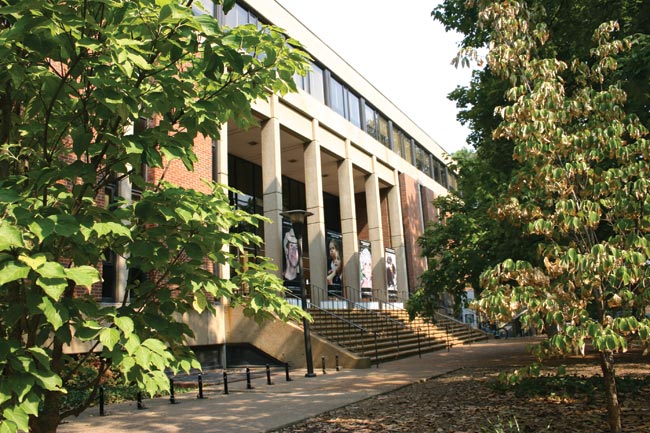
Laptops and PowerPoints have replaced blackboards and chalk, but 50 years after its formation, “our commitment to children remains,” says Vanderbilt Kennedy Center director Elisabeth Dykens. “But children grow into adults. Today the work of the center truly encompasses the life span.”
Founded at George Peabody College for Teachers in 1965, the Vanderbilt Kennedy Center is one of 12 original centers funded as a result of legislation by president John F. Kennedy, who sought to construct a national network devoted to intellectual and developmental disabilities. These are known as Eunice Kennedy Shriver Intellectual and Developmental Disabilities Research Centers.
To form the Vanderbilt Kennedy Center, the Joseph P. Kennedy Jr. Foundation provided $500,000, which was matched by the college. Soon construction began on the Human Development Laboratory (now the Hobbs Building) and the Mental Retardation Laboratory (now One Magnolia Circle). Pioneering psychology researcher and Peabody Professor Nicholas Hobbs was the center’s founding director.

The Kennedy family knew firsthand how challenging life was for people with intellectual disabilities because President Kennedy’s sister Rosemary faced this challenge. The family wanted to bring people with intellectual disabilities “out of the shadows” to live, learn and flourish in their communities.
“Fifty years ago, we had little hope until President Kennedy opened the doors.”
—Elizabeth Dykens
To do so, President Kennedy established a presidential committee whose members included Hobbs, as well as foremost psychology researcher and Peabody faculty member Lloyd Dunn, who established the first doctoral program for special education in the South.
Peabody’s merger with Vanderbilt University in 1979 enabled the Vanderbilt Kennedy Center for Research on Human Development to expand its breadth of discovery into interdisciplinary science. Committed to trans-institutional collaboration, more than 200 Vanderbilt researchers and clinicians in seven schools and more than 25 departments are members.
“The Vanderbilt Kennedy Center has wisely used its historical roots to build positive collaborations among researchers, clinicians, students, staff, families, schools and community partners that together empower us to change the landscape for children and adults with developmental disabilities,” Dykens said. “Fifty years ago, we had little hope until President Kennedy opened the doors. Now we are charged with opening those doors even wider to more opportunities and bigger dreams.”
The Vanderbilt Kennedy Center is one of 67 University Centers for Excellence in Developmental Disabilities, a network of interdisciplinary centers advancing policy and practice for and with individuals with developmental and other disabilities, their families and their communities.
The center houses the Treatment and Research Institute for Autism Spectrum Disorder and the Vanderbilt Leadership Education in Neurodevelopmental Disabilities training program. It is one of only a few national centers to offer such a comprehensive and broad spectrum of programs.